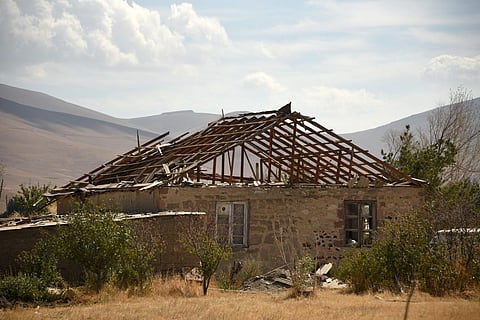More than 210 dead in Armenia-Azerbaijan clashes
YEREVAN: Armenia and Azerbaijan said Friday that more than 210 people died in border clashes this week, with Yerevan accusing Baku troops of atrocities in the arch foes' worst fighting in two years.
US House Speaker Nancy Pelosi said she will travel to Yerevan Saturday after this week's escalation has largely undone recent Western efforts to bring Baku and Yerevan closer to a peace agreement.
The Caucasus neighbours have fought two wars -- in 2020 and in the 1990s -- over the contested Nagorno-Karabakh region, Azerbaijan's Armenian-populated enclave.
Both sides accuse each other of provoking the clashes, which erupted on Tuesday and ended with international mediation overnight on Thursday.
On Friday, Azerbaijan's defence ministry revised the death toll among its troops to 77 from an earlier reported 71.
Armenian Prime Minister Nikol Pashinyan said: "For the moment, the number of dead is 135."
"Unfortunately, it is not the final figure. There are also many wounded," he told a cabinet meeting.
Armenia's rights ombudsperson, Kristina Grigoryan, later said one civilian was also killed and six wounded in shelling by Azerbaijani forces, while hundreds of civilians fled their homes.
The chief of staff of Armenia's armed forces, Eduard Asryan, accused Azerbaijani troops of committing "horrible atrocities," saying they mutilated and dismembered the bodies of dead Armenian servicemen.
Aliyev thanks Putin
Azerbaijani President Ilham Aliyev said, "the fact that the ceasefire is being respected proves that neither Azerbaijan, nor Armenia, intended for large-scale escalation".
He said he regretted "numerous victims from both sides", saying what was "most important now is not to wreck the nascent process of normalising ties".
Speaking at a meeting with Russian President Vladimir Putin in the Uzbek city of Samarkand, Aliyev thanked him for Moscow's "rapid reaction to the escalation".
Putin, for his part, expressed satisfaction the ceasefire was holding but noted the overall "situation remains tense".
It was the worst fighting since the two countries fought a six-week war in 2020 and comes with Armenia's closest ally Moscow distracted by its nearly seven-month war in Ukraine.
Armenia's security council said the violence ended late Thursday "thanks to international mediation" after earlier failed attempts by Moscow to broker a truce.
A delegation of the Collective Security Treaty Organisation (CSTO) -- a Moscow-led grouping of ex-Soviet republics -- arrived in Yerevan Thursday evening, Armenia's defence ministry said. Armenia is a member of CSTO but Azerbaijan is not.
On Tuesday, Armenia's security council asked for military help from Moscow, which is obliged under the treaty to defend Armenia in the event of a foreign invasion. But the Kremlin -- which also has close ties with Baku -- did not rush to help Yerevan.
"We asked for military help and our demand was not accepted. Obviously, we are not happy," Armenia's security council chairman, Artyom Grigoryan, said Friday.
Transport sticking point
With Moscow increasingly isolated on the world stage following its February invasion of Ukraine, the European Union had taken a lead role in mediating the Armenia-Azerbaijan normalisation process.
During EU-mediated talks in Brussels in April and May, Aliyev and Pashinyan agreed to "advance discussions" on a future peace treaty.
They last met in Brussels on August 31, for talks mediated by European Council President Charles Michel. The talks also focus on border delimitation and the reopening of transport links.
The issue of ensuring a land transport link between Turkic-speaking Azerbaijan and its ally Ankara via Armenian territory has emerged as the primary sticking point.
Azerbaijan insists on Yerevan renouncing its jurisdiction over the land corridor that should pass along Armenia's border with Iran -- a demand the Armenian government rejects as an affront to the country's sovereignty and territorial integrity.
The six weeks of fighting in 2020 claimed the lives of more than 6,500 troops from both sides and ended with a Russian-brokered ceasefire.
Under the deal, Armenia ceded swathes of territory it had controlled for decades, and Moscow deployed about 2,000 Russian peacekeepers to oversee the fragile truce.
Ethnic Armenian separatists in Nagorno-Karabakh broke away from Azerbaijan when the Soviet Union collapsed in 1991. The ensuing conflict claimed around 30,000 lives.

